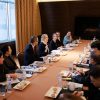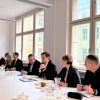The New Europe Center team have been exerting efforts for the integration of Ukraine into the European Union for many years. We worked equally hard and with inspiration both in the EU countries and in the regions of Ukraine. Obtaining the EU candidate status is a special moment for us, as well as for the whole country. Hundreds if not thousands of comments and articles; dozens of studies; hundreds of speeches at events in Ukraine and abroad – it is difficult to count all the steps. However, we decided to recollect the most memorable initiatives of the Center, which made Ukraine closer to this day:
How to get rid of post-sovietism? We realized that the path to the EU would be difficult – there are deep obstacles (sometimes at the level of psychology), which distance us from the older European democracies. Ten years ago, our team conducted a thorough study “How to get rid of post-sovietism?”. Under post-soviet, we meant a mixture of soviet habits, which in the new conditions have changed and manifested over time in worse forms. Intolerance, the dominance of nepotism and bribery, plagiarism, and many other deviations… “Europeanization” was our first of ten recommendations to eradicate post-soviet habits, to change the whole Ukraine. If you would like to compare what has changed in ten years on this issue, then follow this link: http://neweurope.org.ua/wp-content/uploads/2017/12/postsov_all_english.pdf If you would like to know how far you have departed from the post-soviet model of behavior, we invite you to take a semi-humorous test on this topic: http://neweurope.org.ua/test-na-postsovkovist/
Street European universities. In 2013, the team of the New Europe Center initiated a creative project – to visit the regional and district centers of those regions that are either undecided or hesitant about the European course of our state. Leading experts, and ambassadors of the EU countries at our invitation read European lections just on the streets of Odesa and Nizhyn; Konotop and Kropyvnytskyi; Cherkasy and Kremenchuk; Zhytomyr and Kherson (a total of more than 20 cities and towns). The most interesting component of our educational project was street exhibitions of caricatures depicting two realities: a comparison of the state of affairs in the EU and Ukraine in identical areas (education, judiciary, health care, etc.). Of course, the comparison was not in Ukrainian favor. Here you can find the booklet “A better side of Europe”: http://neweurope.org.ua/en/analytics/krashha-storona-yevropy/
A small report in figures: our events were attended by no less than 35 000 Ukrainians; the New Europe Center team has covered 9 000 km with this project (distance from Kyiv to Jakarta or Cape Town), visiting 13 regions and AR Crimea. Many participants of our European lectures later became participants of the Euromaidan, supported the signing of the Association Agreement.
Some information about the impact of European lectures: in September 2013, our team held a European lecture in Simferopol. Soon a story about it appeared in Dmitry Kiselyov’s “news”, where journalists distorted everything they could: the invited lecturer, the Deputy Ambassador of the United Kingdom, was called the director of our think tank; the booklet “A better side of Europe” was called “Euro-primer” specifically prepared by the EU “for brainwashing” Ukrainians (our Center did not receive a penny from the EU for this initiative, by the way). Many local politicians have resisted any our attempt to tell the truth about the European Union. In Kharkiv, we were not allowed to hold a European lecture, in Zaporizhia we were threatened, and Kyiv City State Administration forbade us holding a European university on Khreshchatyk … The mayor of the city personally addressed the EU ambassador with a request to “influence” us. The exhibition still took place after a major scandal in the media – however, it had to be held on Mykhailivska Square.
Ukraine in its own eyes. “We have heard a lot about Ukraine, but perceived it completely differently. Thank you for the opportunity to come here, we see that your streets, houses, and friendly people are the same as in Europe”,– this is how one of the famous Italian journalists shared her impressions of Kyiv, when she arrived in Kyiv in 2014 at the invitation of our think tank. Mass propaganda of Russia, which accompanied the beginning of the aggression against Ukraine in February 2014, revealed a serious problem – there was significant demand for information about Ukraine in the world, but in fact, there were no foreign experts, who would deal with Ukraine professionally.
We have launched an ambitious initiative – created a club of Ukraine’s friends in Europe and the United States. In total, we organized more than 14 study visits: leading journalists of world media and experts of key think tanks were participants of these trips. Some of them visited Ukraine for the first time. Most of the participants of our study visits actively advocated for granting Ukraine the EU candidate status, are now standing up for Ukraine’s victory in the war unleashed by Russia. The video report on the latest study visit for French opinion leaders can be found here: http://neweurope.org.ua/video-ukrayina-fratsuzkymy-ochyma/
Visa-free regime advocacy. Our team has also been involved in the development and active advocacy of arguments that refute the allegations of the main skeptics in the EU (in particular, law enforcement and migration agencies). These arguments were actively used by government officials and parliamentarians in negotiations in key EU capitals. We did not do without creativity here either – we dedicated a symbolic exhibition of caricatures in the open air in Shevchenko Park in summer 2017 to the beginning of visa-free travel.
European map of Ukraine. We realized that Ukraine would not be able to integrate into the EU only with the efforts of Kyiv alone. The New Europe Center sought to show that many things depend on local authorities. It is for this purpose that we decided to carry out an annual assessment of the European successes of each region of Ukraine. In 2019, the world saw the first rating of the European integration of Ukrainian regions called the “European map of Ukraine”. We were especially pleased to find out that in some respects, the eastern and southern regions were ahead of the western regions, which were considered a priori more European due to their proximity to the EU and higher public support of the European course of the state. We discussed European integration successes in Zaporizhzhia, Mariupol, Dnipro, Odesa, Sumy, Kherson, and other cities of Ukraine. You can get acquainted with the latest, third, “European map” via this link: http://neweurope.org.ua/en/analytics/yevromapa-ukrayiny-3-rejtyng-yevropejskoyi-integratsiyi-oblastej/
Voice of intellectuals. Four years ago, our Center prepared for publication a collection of essays by Ukrainian intellectuals “New Europe” – we sought together with famous Ukrainians to work out what the future Europe should look like, and what the place of Ukraine in this new Europe should be (together with the Old Lion Publishing House). The book was included in the list of the best books in 2018 according to the Ukrainian PEN Club. One of its authors, by the way, was the current Minister of Foreign Affairs Dmytro Kuleba. “I doubt that the EU will appreciate the slogans ‘Ukraine is Europe’ as long as they are heard exclusively from Ukrainians. The slogan ‘Ukraine is Europe’ will take on a completely different value if it is affirmed in Berlin, Paris and Rome.”Alyona Getmanchuk, director of the New Europe Center, wrote in her essay. Today we finally heard voices from Berlin, Paris and Rome: Ukraine is Europe! Find more opinions of intellectuals about the European future of Ukraine here: http://neweurope.org.ua/en/novu-yevropu-prezentuvaly-v-kyyevi/
Research efforts. We have paid great attention to ensuring that our communication initiatives are based on a research foundation. Significant analytical work has recently been presented within the project “Between the Association and Membership: What can be the next purpose of Ukraine in relations with the EU?” (http://neweurope.org.ua/project/modeli-chastkovoyi-integratsiyi-do-yes-na-osnovi-prykladiv-p-yaty-krayin-regioniv/). A significant part of our policy papers is devoted to the perception of Ukraine by the societies of the EU member states, as well as the perception of European integration by Ukrainians. By the way, our center has previously noted that many European societies were more far-sighted than their governments. For example, our 2020 survey showed that half of Germans were in favor of Ukraine’s future membership in the EU. A poll conducted by Kantar in France, Germany and the Netherlands on June 9-13 this year showed that more than 60% of respondents (among those who made their mind) support granting the EU candidate status to Ukraine as soon as possible. Follow this link to find out more information: http://neweurope.org.ua/en/analytics/en-public-opinion-in-germany-france-and-the-netherlands/
The EU candidate status for Ukraine. Of course, the most active efforts regarding Ukraine’s candidacy have been made in recent months. Our analysts maid an advocacy visit to Paris, Berlin, and Hague, negotiating with those who directly influence decision-making on European issues. We prepared analytical materials with clear arguments why the European Union will benefit from Ukraine’s integration; responded to the fears of Europeans, who were skeptical about granting Ukraine the EU candidate status. Together with partners, we initiated an appeal by Ukrainian NGOs calling on the EU to grant Ukraine candidate status in June this year – more than 200 organizations became signatories of the appeal (an unprecedented act in the history of Ukraine). The above-mentioned poll was also conducted. Find more about our latest efforts on our website: http://neweurope.org.ua
Of course, we would not like to exaggerate our efforts on the Ukrainian way back to Europe. After all, hundreds of friends from partner think tanks, non-governmental organizations, diplomats, and politicians both in Ukraine and abroad helped us in this. However, without a doubt, bringing Ukraine closer to the EU would be futile and unfeasible without the efforts of every Ukrainian.
The courage of Ukrainian women and men on the front line and in the rear – is indispensable and the most significant contribution to the new Ukraine in the new Europe, for which every European, every person standing on the best side of history – on the side of truth – should be grateful.








